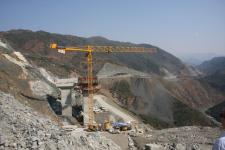 Opposition parties and independent economists have panned Tirana’s centre-right government for acting ”irresponsibly” by accepting what they say is an exorbitantly high interest rate on a commercial loan to finance the Albania-Kosovo highway.
Opposition parties and independent economists have panned Tirana’s centre-right government for acting ”irresponsibly” by accepting what they say is an exorbitantly high interest rate on a commercial loan to finance the Albania-Kosovo highway.
“The government has indebted its citizens in order to finance its pre-electoral spending,” former Minister of Finance and opposition MP Arben Malaj said in a press conference.
“Almost 75 per cent of Rreshen-Kalimash [part of the Kosovo road] has been financed by borrowing and almost 53 per cent of the 680 million euros that have officially been spent for the highway have gone to cover interests paid for the loans and for the profits that the contractor is accumulating,” Malaj added.
The government announced on Tuesday that it has reached an agreement with several foreign and local banks for a 250 million euro loan, accepting to pay highest ever interest Euribor plus 9.65 per cent. The first tranche of 95 million euros will be disbursed immediately while the second trance of 155 million euros will be disbursed in June.
Defending its decision the minister of Finance Ridvan Bode said that the “interest rates are determined by the market and as such, one cannot say that they are high or low.”
“Other countries in our region want to get loans with interest rates of 20 or 23 per cent, but had not managed to get them,” Bode said in his defense.
However, his decision is also raising eyebrows within the banking community.
The interest rate accepted by the government is by comparison higher than local currency denominated bonds and much higher than most Albanians pay for their mortgages.
According to the statistics of Albania’s Central Bank, interest rates for loans in euro varied from 7 to 9.67 per cent in March.
Treasury bills denominated in lek averaged a rate of 9.17 per cent this week.
“That interest rate is strange,” said a top banker in condition of anonymity to Balkan Insight.
“The [government] debt nominated in euro is much more expensive than that in local currency, and everyone knows that euro is less risky than the lek,” he added.
 Eurasia Press & News
Eurasia Press & News
